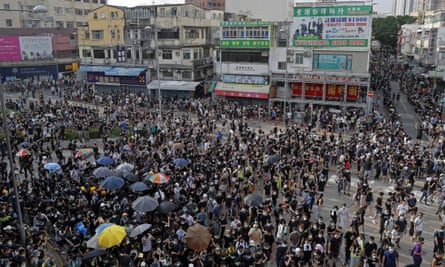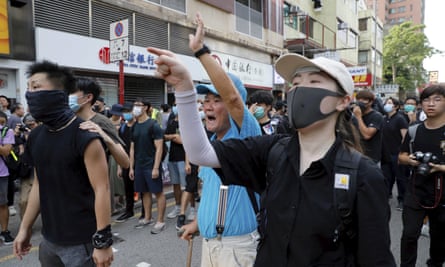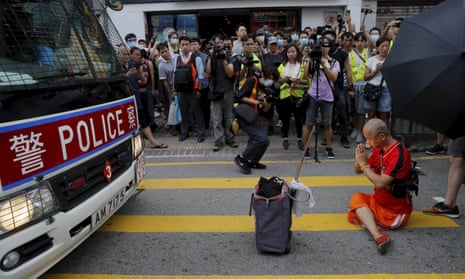An old Chinese idiom has become the key catchphrase of Hong Kong’s social discourse in recent days. Pien Dei Hoi Fa – flowers blooming everywhere – is the term being used to describe the emergence of local protests and so-called Lennon walls, colourful collages of sticky labels with political messages, that are popping up in local communities all over Hong Kong.
Millions in this former British colony have flocked to the streets in several mass protests over the past month to fight against a proposed law that would allow individuals to be extradited to stand trial in China’s opaque courts. Now, feeling emboldened by the solidarity and big turnout at recent protests, which have made headlines across the world, Hong Kong people are now riding on the wave of their success to speak up on a range of issues, which are generally related to their discontent with the encroachment of China into Hong Kong.
Over the past weeks, there have already been many smaller scale rallies on the sidelines of the main protests, among them a couple of mothers’ rallies urging the authorities to listen to young people and numerous open-air Christian gatherings urging peace.

But many more, with different themes, are in the pipeline: there are at least five planned protests or rallies over the coming week and nine until the end of the month, and lists of these are going viral on social media.
On Saturday thousands of people turned out for a Reclaim Sheung Shui protest in a town near the mainland border, a show of anger against so-called parallel traders who snap up goods ranging from foreign-made formula milk to cosmetics and medicines and resell them in China. On Sunday, a rally in Shatin against the extradition bill and a separate journalists’ march on Hong Kong island against the police’s rough handling of reporters are planned. There will be an elderly people’s march to support the young next Wednesday and a rally against pro-Beijing media in the next few weeks.
Such frequent protests are rare in Hong Kong, where people are known for their stoical work ethic in a city that has some of the highest property prices in the world and little social welfare provision.
Many interviewed by the Observer in the Sheung Shui protest on Saturday said the millions-strong anti-extradition protests last month had become a lightning rod for them. Many have been accumulating pent-up anger against the government for policies they felt they had endured long enough.
These have ranged from expensive infrastructure projects aimed at stepping up the integration of China and Hong Kong to planned legislation on the Chinese national flag and anthem to punish those who show disrespect. But there are less political, local issues as well.
“Restore Sheung Shui to its former glory!”, “Restore our serenity!” and “Kick out parallel traders!” shouted many in the march attended by thousands on Saturday. They said they resented the government having turned a blind eye to the border town being overrun with parallel traders for over a decade. They accused them of filling the streets with cardboard boxes of commodities and leaving behind piles of rubbish, while neighbourhood shops were squeezed out of business due to high rents and replaced by shops selling goods popular with mainland tourists and traders.
“The anti-extradition protests have heightened our awareness over community issues. Instead of waiting for the government to do something, we may as well take it into our own hands,” said Vincent Yeung, a man in his 20s.

Others describe the huge anti-extradition protests in the past month as “an awakening” to remind them that China is also eroding Hong Kong’s way of life.
“We feel our way of life is being threatened and we’re surrounded by mainland China. I grew up here but now local shops are few and far between,” said a waitress who gave her name as Yo.
“We are powered by the same energy [as the anti-extradition protests],” said Alan Leung, a young professional. “People want to keep the momentum going and spread the protests everywhere.”
“‘Don’t mess with us’ is the message we want to tell the Chinese and Hong Kong governments,” said Leung, who has participated in past “reclaim” demonstrations, including one last week in Tuen Mun to protest against noisy dance performances by entertainers who also provide sex services.
Hong Kong’s culture of protest has its roots in its political system, which gives ordinary people little say in how their city is run.
Its leader is not elected by ordinary voters but by an elite committee accountable to Beijing. Only half of the 70-seat legislature is directly elected, while the other 35 seats are occupied by mostly pro-establishment figures from corporate and special interest groups. Moreover, by ejecting six pro-democracy lawmakers and barring candidates seen as pro-independent from running for elections, the Hong Kong government took away the pro-democracy camp’s power to block unpopular policies in the legislature.
With the legislature deprived of its checks and balances role, many Hong Kong people say the only way to voice their opposition to government decisions is to take to the streets. Even after a month of several huge protests, the zest for more protests seems unquenchable and there is no sign they are dying down.
“This is a spillover effect of a mass movement whose demands were not met by the Carrie Lam government and officials,” said Kenneth Chan, a political science professor at Hong Kong Baptist University. “Some of the actions are directly related to the government’s failure in handling the extradition saga, but there are also long-drawn-out issues like the impact of ‘mainlandisation’ on Hong Kong communities,” he said.
“All these point to a critical issue about the post-1997 governance: there has not been a government properly chosen by the people of Hong Kong; the officials are increasingly seen to work to blur the boundaries between Hong Kong and mainland China.”
Over the past few weeks, the anti-extradition movement has not only morphed into a bigger movement encompassing a range of different plights, but has also re-ignited people’s demand for universal suffrage. Many people in recent protests have held up yellow umbrellas, emblems of the 2014 Umbrella civil disobedience movement that tried but failed to press China to grant Hong Kong people an unfettered vote, and shouted “I want genuine universal suffrage!”
“People really feel threatened that the government thought it could do whatever it wanted,” said Jean-Philippe Béja, research emeritus professor at the Centre for International Studies and Research at Sciences-Po in Paris. “The extradition bill has crystallised all sorts of discontent and people believe that universal suffrage would solve these problems,” he said. “If they don’t speak up, no one will help them so they’re taking their destiny into their own hands.”

But Hong Kong’s political future remains uncertain as its government is beholden to China. China has already decided in 2014 that it will allow “universal suffrage” so long as it can first vet the leadership candidates before Hong Kong people can vote. It has shown no sign of allowing democratisation since.
“Hong Kong is facing the world’s most powerful authoritarian regime,” said Chow Po-chung, a professor of government and public administration at the Chinese University of Hong Kong. “The target of people’s resistance is China and [its leader] Carrie Lam has no autonomy.”
Willy Lam, a China expert at the Chinese University of Hong Kong, said Lam’s government is now a lame duck with no legitimacy and is awaiting orders from Beijing. While China is yet to properly respond to Hong Kong’s biggest political crisis in decades, he expected Beijing will continue to extend its policies and governance models to Hong Kong.
“Hopes have been ignited but the result is not known,” said Lam. “But the Communist party will intensify its rule over Hong Kong.”
